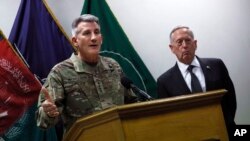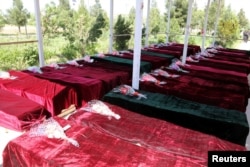Days after the brazen Taliban attack on an Afghan military base, top U.S. military officials are "not refuting" reports Russia has been arming the insurgent group.
"We continue to get reports of this assistance and, of course, we had the overt legitimacy lent to the Taliban recently by the Russians that really occurred late last year," said U.S. General John Nicholson, the ground commander for international forces in Afghanistan.
Nicholson made the comments Monday in Kabul alongside U.S. Defense Secretary Jim Mattis, who made a previously unannounced visit to Afghanistan, after stops in Qatar and Djibouti.
Mattis noted Russia is choosing to be a strategic competitor in a number of areas, including in the war-torn South Asian country.
"We will engage with Russia diplomatically, we will do so where we can, but we will have to confront Russia when what they are doing is contrary to international law or denying the sovereignty of other countries," Mattis told reporters in the Afghan capital, where he also met with Afghan President Ashraf Ghani and Chief Executive Abdullah Abdullah.
Deadly attack
The U.S. defense secretary's visit Monday comes days after about 10 Taliban militants killed at least 140 people April 21 in the deadliest insurgent raid on an Afghan military base in 16 years.
The militants were dressed as Afghan soldiers when they arrived at the regional headquarters of the Afghan National Army in Mazar-i-Sharif, the capital of Balkh province.
General Mohammad Radmanesh, a spokesperson of the Afghan Ministry of Defense, said that the militants were allowed on the base without all of the proper checks after pleading for urgent care for a man in their vehicle who was covered in blood.
The Taliban claimed responsibility for the attack and said it was in retaliation for the recent killings of Taliban shadow governors for Kunduz and Baghlan provinces.
The Afghan government is investigating the incident and, on Monday, President Ghani announced that Defense Minister Abdullah Habibi and Army Chief of Staff Qadam Shah Shahim were stepping down in the aftermath of the siege.
Mattis on Monday noted the "barbaric" nature of the attack and the challenges associated with the mission.
"2017 is going to be another tough year for the valiant Afghan security forces and the international troops who have stood, and will continue to stand, shoulder to shoulder with Afghanistan against terrorism," he said.
The defense secretary said there was a "pretty low standard" for the Taliban to join the Afghan political process, noting they "need only to renounce violence and reject terrorism."
Long-term US-Afghanistan policy
Mattis traveled to Afghanistan as U.S. President Donald Trump has directed a review of U.S. policy for the country and as Ghani looks to announce a four-year security plan for his nation in the coming weeks.
Possible elements of the four-year plan include the provision of up to 200 U.S. helicopters and other aircraft for Afghan forces, along with doubling the number of Afghan special forces, according to U.S. and Afghan officials familiar with the ongoing discussions.
However, a U.S. official stressed to VOA on Monday that the Pentagon is still working with Congress and the White House to firm up the new administration's Afghanistan policy and financial commitments before making any final planning decisions.
When asked by reporters Monday about deploying more U.S. forces to Afghanistan amid what General Nicholson has called a U.S. stalemate with the Taliban, Mattis said he was "owed some degree of confidentiality" on what he will recommend to Trump.
"Right now we are engaged in defining the challenge [and] the way ahead with a whole lot of nations. There is no one nation that is going to carry all of this," Mattis said.







